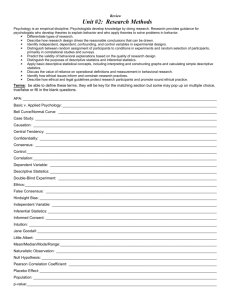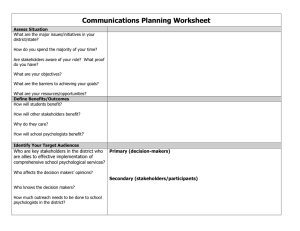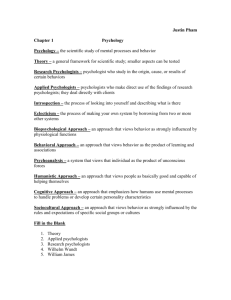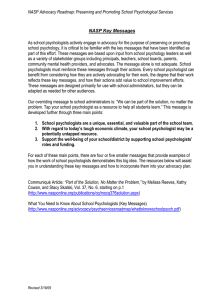1 2 Mental health support & ethical considerations
advertisement
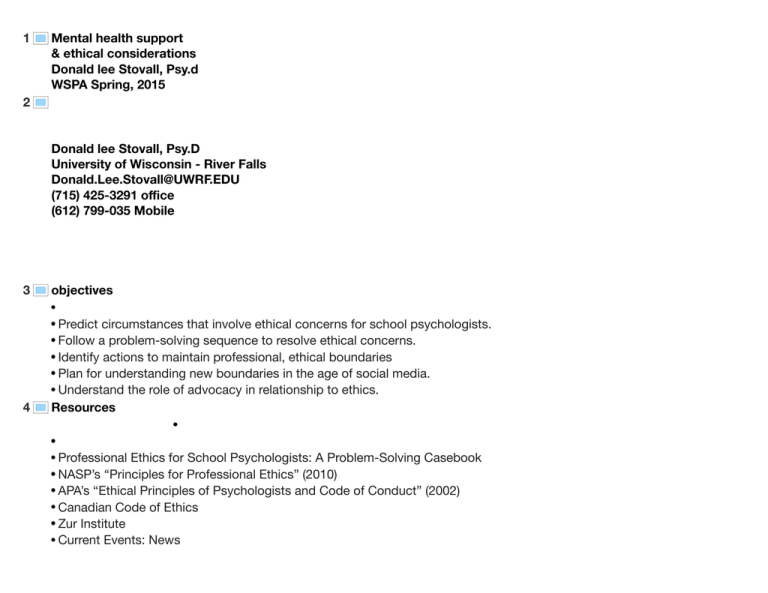
1 Mental health support & ethical considerations Donald lee Stovall, Psy.d WSPA Spring, 2015 2 Donald lee Stovall, Psy.D University of Wisconsin - River Falls Donald.Lee.Stovall@UWRF.EDU (715) 425-3291 office (612) 799-035 Mobile 3 objectives 4 Predict circumstances that involve ethical concerns for school psychologists. Follow a problem-solving sequence to resolve ethical concerns. Identify actions to maintain professional, ethical boundaries Plan for understanding new boundaries in the age of social media. Understand the role of advocacy in relationship to ethics. Resources Professional Ethics for School Psychologists: A Problem-Solving Casebook NASP’s “Principles for Professional Ethics” (2010) APA’s “Ethical Principles of Psychologists and Code of Conduct” (2002) Canadian Code of Ethics Zur Institute Current Events: News 5 6 7 8 9 10 11 12 13 Leigh Armistead, Barbara Bole Williams & Susan Jacob Counseling Definition “The application of mental health, psychological or human development principles, through cognitive, affective, behavioral or systemic interventions, strategies that address wellness, personal growth, or career development, as well as pathology.” American Counseling Association Therapy Definition Treatment intended to cure or alleviate an illness or injury, whether physical or mental. The American Heritage® New Dictionary of Cultural Literacy, Third Edition. Copyright © 2005 by Houghton Mifflin Company Implications of Counseling for School Psychologists School psychologists speak in terms of supporting students in schools who may have a need for mental health services. School psychologists do not often speak of “curing” students, which is closer to the definition of therapy. School psychologists can play a very active role in terms of supportive mental health services for students in need. FERPA Family Educational Rights and Privacy Act of 1974 (FERPA) is designed to protect the confidentiality of student records from unauthorized access, and to provide rules on rights to review, rights to challenge accuracy of information, storage, and communication of information. What is an educational record? All files, records, documents that are directly relate to the student and are maintained by and educational agency or institution. This includes all records regardless of the medium (notes, email, video-tapes, audio tapes, computer files, medical and health records, discipline reports, and correspondence about the student’s performance). HIPPA The Health Insurance Portability Act (HIPPA) of 1996 established national standards on the sharing of information with a focus on privacy and how information is shared (protected information). Health information is considered private and is only disclosed according to patient consent HIPPA & SCHOOLS Public schools typically are not covered by HIPPA requirements because they are not considered a HIPPA covered entity or that they maintain “educational records” not health records. HIPPA excludes educational records. Hippa & Schools Documentation of services provided by a school psychologist to a student fall under educational records (FERPA applies). Things begin to change if third party billing occurs (health insurance), or if services are provided by and paid to an outside agency or professional who is subject to HIPPA regulations. Liability & Immunity 13 14 15 16 17 Documentation of services provided by a school psychologist to a student fall under educational records (FERPA applies). Things begin to change if third party billing occurs (health insurance), or if services are provided by and paid to an outside agency or professional who is subject to HIPPA regulations. Liability & Immunity Liability is the position of being held legally accountable for an action in a civil or legal case. Immunity is an exception from a liability or duty What are School-based mental health services? Supporting Counseling: self-esteem, grief and loss Facilitating a social skills group, friendship group, or other group focused on interpersonal relationships Crisis Responding: adolescent with suicide ideation, anger outbursts with threat to harm Positive Behavior and Supports Programs Social Skills Training, Self-management Bully Prevention Diversity Awareness and Training Consultation with Service Providers http://www.nasponline.org/advocacy/mhbrochure.aspx Passive Consent One mechanism to support school psychologists involvement in providing school based mental health services is to use passive consent. Passive consent involves communicating to caregivers and the community the types of mental health services a school psychologist can provide through announcements and school board minutes. Foundations of Ethics: W. D. Ross (1930) Nonmaleficence – do no harm Fidelity – faithfulness to the truth and one’s professional duties Beneficence – do good Justice – ensure others are treated in a fair and nonbiased manner and that all persons have equal access to what school psychology has to offer Autonomy – respect for the right of individuals to have a voice in decisions that affect them Broad Ethical Principles Do No Harm Respect Dignity of All Persons Professional Confidence and Responsibility 18 Respect Dignity of All Persons Professional Confidence and Responsibility Honesty and Integrity in Professional Relationships Responsibility to schools,families, communities, the profession and society From the Authors: Well, It Depends 19 20 It Depends Context of the problem Nuance of the setting Complexity of the problem Experience base of the practitioner Immediacy of a response/action Implications of the response/action The Right Answer Rather than thinking in terms of "the right answer", better to think in terms of appropriate ethical behavior, such as acting in the best interest of the student, family, teacher or person we are working with. 21 22 Ethical situations can develop from seemingly benign situations; school psychologists serve several populations whose interests may differ from one another (the question of who is your client?) Schools as government agencies are subject to regulation and review Schools’ primary concern is the development of academic skills School Psychologists School psychologists employed by the public schools are an extension of the state government’s authority (power) to educate. When school psychologists employed by a school district make decisions in their official roles, their decisions are seen as actions by state government. In legal terms, school-based psychologists are state actors. 23 Most school psychologists don’t feel as if they are fully prepared to handle ethical dilemmas; 24 Training is needed because some Ethical standards are not clear or ambiguous; 24 Training is needed because some Ethical standards are not clear or ambiguous; For example, the following principle can generate broad questions for discussion: “School psychologists consider children and other clients to be their primary responsibility,acting as advocates for their rights and welfare” (NASP, IV. A. 1.) Who are “other clients?” What are appropriate forms of advocacy? 25 26 27 28 29 30 31 32 33 Training is needed because some situations involve competing ethical principles; “School psychologists understand their obligation to respect the rights of a child to initiate, participate in, or discontinue services voluntarily” (NASP, III. B. 3). vs. “School psychologists respect the wishes of parents who object to school psychological services” (NASP, III. C. 4.) How do school psychologists decide how to handle ethical dilemmas? ethical problem solving process Regardless of experience base, all practitioners need a problem-solving process related to ethical issues/ethical concerns problem-solving model 7 steps Koocher & Keith-Spiegel (2008) Describe the Problem Situation Define the potential ethical-legal issues involved Consult available ethical-legal guidelines Consult with supervisors and colleagues Evaluate the rights, responsibilities, and welfare of all affected parties Consider alternative solutions and consequences of making each decision Make the decision and take responsibility for it. A Case for Discussion 33 A Case for Discussion Minn. Family Waits to Hear if Hockey Shot is worth $50K -Fox News Minnesota Boy Makes $50,000 Hockey Shot - Happy News Boy who hit $50,000 hockey shot may not get the money - CBS News 34 35 36 37 38 39 40 41 Boy’s $50,000 Hockey Shot Slapped Away - ABC News $50,000 Hockey Shot??? Hockey Shot: More to the Story Proposed Policy to Recognize TeSt Score Achievement For students at the high school level, color-coded identification cards and student planners will be distributed based on performance on state standardized tests. High scoring students will achieve special privileges at school or school related events, and at some local businesses. Gold cards (and planners) and highest privileges to those who score at the highest level, black cards (and black planners) for those who meet standards, and white cards (and white planners) for those who do not meet standards (no special privileges). California HIgh school Color ID System : Reinforcement or Shaming? Consider Positive and Unintended consequences of Your actions The medical perspective of “side effects” is useful for school psychologists to consider. Psychologists use different terminology (inadvertent learning for example), but in planning interventions, recommendations, strategies, consider what could be lost as well as what is gained from an action you select. Advocacy, Mental Health and Ethics To fully support students, school psychologists and others supporting mental health must act, as in some situations, doing nothing contributes to harm “Culturally skilled counselors should attend to and work to eliminate biases, prejudices, and discriminatory practice” (Sue, Arredondo, & McDavis (1992, p.483). Dr. Zur: Introduction to Boundaries Boundaries: Reformulated for School Psychologists Gifts Touch Home Visits 42 43 44 45 Touch Home Visits Shared Social Groups in Small Communities E-mail Facebook and Other Social networks Texting Students or Family Telephone Access Googling and Internet Searches Two Types of Concerns Boundary Violations: abuse of power or other clearly inappropriate action Boundary Crossing: more neutral or therapeutically appropriate interaction such as use of self disclosure to model in a group, home visits to a family, gifts to or from students (high school senior), attending a therapy appointment or medical appointment with a student/family Boundary Crossing Some dual relationships for school psychologists are not avoidable. For example, living in a smaller community, psychologist’s children may be on the same sports team in community education as a student you have in a group at school. Dual relationships are not inherently unethical, but should be acknowledged Dr. Zur Boundaries: Dual Relationships From the Authors: two of the most challenging issues confronting school psychologists are Privacy and confidentiality Basic Suggestion: always review limits of confidentiality at the beginning of a professional relationship, keep parents informed when seeing their child, but ask them to preserve the child's privacy in their relationship with you, Give them General updates about their child's progress 46 47 Privacy and Confidentiality Neither seek nor maintain records of information that is not needed to provide services Obtain information in a legally and ethically appropriate manner, and from responsible sources Limit disclosure of confidential information Procedural Safe Guards for Parents in Public School Settings Parents have right to confidentiality of records and right to examine records; right to give consent prior to 47 48 49 50 51 52 53 Procedural Safe Guards for Parents in Public School Settings Parents have right to confidentiality of records and right to examine records; right to give consent prior to evaluation; right to written prior notice before changes are made in identification, evaluation, placement, and special services; right to present findings from an independent evaluation; right to resolution of complaints by a resolution meeting, mediation, or an impartial hearing officer. Informed Consent Ethically, “…school psychologists seek parent consent (or the consent of an adult student) prior to establishing a school-psychologist client relationship for the purpose of psychological diagnosis, assessment of eligibility for special education or disability accommodations…” NASP Ethics History of Informed Consent CONSENT ELEMENTS C Competent to make the decision O Open to make the decision N Necessary Information S Steps to follow if you agree or disagree E Understand the Explanation N Notify Someone of Your Decision T Tick the box and sign When You Say, “Is That Okay With You?”, What are you Asking For? Consent: Competent, Knowing, Voluntary Assent: Veto power Permission: judgement in agreement that the plan of action is appropriate Informed Consent:Key Aspects Information (anticipated course of treatment, involvement of third parties, benefits and risks) Understanding (Comprehension of services and options, limits of confidentiality, access to records) Voluntary Decision-Making Ability Consent (Parent) Assent (minor) Documentation of consent (written or verbal) where Informed Consent is Not needed Informed consent is not needed when the services provided are considered part of typical educational practices, such as part of a curriculum; associated with classroom management methods, or naturalistic observations 54 55 56 57 58 59 60 Informed consent is not needed when the services provided are considered part of typical educational practices, such as part of a curriculum; associated with classroom management methods, or naturalistic observations Consent Not Needed Parent consent is not required for a review of existing data as part of an evaluation or reevaluation. In addition, the screening of a student by a teacher or specialist to determine appropriate instructional strategies for curriculum implementation is not considered to be an evaluation requiring parental consent under IDEA 2004. (e.g., RTI) Parent consent is not required for a child to participate in class or school testing. Sharing Information With Parents Supportive counseling or mental health services is conducted in an environment where the student feels safe to discuss issues impacting their self-esteem, mood, adjustment, or behavior. Parents have a reasonable expectable to be involved and informed about services for their child to all them to fulfill their parental responsibilities. Ethical Situation: Processing Options Students Sue District Lawsuit Story:Ethical Principles Re-Applied Question of Doing Nothing Contributes To Harm (Do No Harm) Respect Dignity of All Persons (Ignoring needs leads to lack of respect for their dignity) Professional Confidence and Responsibility (who are psychologist responsible to, district policy or district needs?) Honesty and Integrity in Professional Relationships Responsibility to schools,families, communities, the profession and society (challenge when community has differing expectations) Components of An Ethical Practice Stay current on literature on ethics Anticipate ethical concerns, be proactive in your setting Apply a decision-making model Discuss confidentiality, consent in an intentional manner Define advocacy as clearly a part of your role as school psychologist Promote wellness and mental health needs of students as well as academic (NASP Communique, October 2011) References American Psychological Association (2002).Ethical Principles of Psychologists and Code of Conduct. American Psychologist, 57, 1060 – 1073. American Psychological Association, Board of Professional Affairs’ Advisory Committee on Colleague Assistance (2006). Advancing colleague assistance in professional psychology (monograph - February). 61 American Psychological Association, Board of Professional Affairs’ Advisory Committee on Colleague Assistance (2006). Advancing colleague assistance in professional psychology (monograph - February). Canadian Psychological Association (2000). Canadian code of ethics for psychologists, third edition. Available at http://www.cpa.ca. Cottone, R. R., & Claus, R. E. (2000). Ethical decision-making models: A review of the literature. Journal of Counseling and Development, 78, 275–283. Dailor, A. N. (2007). A national study of ethical transgressions and dilemmas reported by school psychology practitioners. Unpublished Master’s Thesis: Central Michigan University. Hunley, S., Harvey, V., Curtis, M., Portnoy, L., Chesno Grier, E., & Helffrich, D. (2000). School psychology supervisors: A national study of demographics and professional practices. Communiqué, 28(8). Jacob, S. (in press). Best practices in developing ethical school psychological practice. In A. Thomas & J. Grimes (Eds.), Best Practices in School Psychology V. Bethesda, MD: National Association of School Psychologists. Jacob, S., & Hartshorne, T. S. (2007). Ethics and law for school psychologists (5th ed.). Hoboken, NJ: John Wiley. Jacob-Timm, S. (1999). Ethical dilemmas encountered by members of the National Association of School Psychologists. Psychology in the Schools, 36, 205–217. McNamara, K. (in press). Best practices in the application of professional ethics. In A. Thomas & J. Grimes (Eds.), Best Practices in School Psychology V. Bethesda, MD: National Association of School Psychologists. National Association of School Psychologists. (2000). Professional conduct manual: Principles for professional ethics. Bethesda, MD: Author. Tryon, G. S. (2001). School psychology students’ beliefs about their preparation and concern with ethical issues. Ethics and Behavior, 11, 375–394. Williams, B.B., Armistead, L. & Jacob, S. (2008). Professional ethics for school psychologists: A problem-solving model casebook. Bethesda, MD: National Association of School Psychlogists. References Continued http://people.wku.edu/jan.garrett/ethics/rossethc.htm (W.D.Ross) http://www.startribune.com/local/north/104456218.html (students deaths wears on counselors) www.zurinstitute.com
